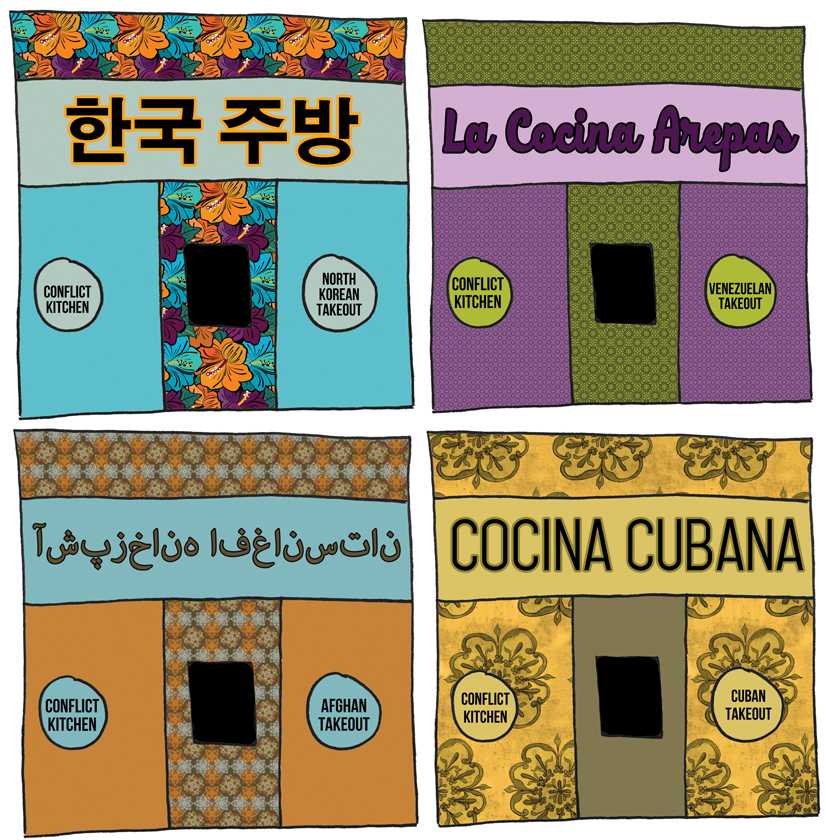Pittsburgh was always filled with mysterious things to do as I was growing up.
Places such as the Mattress Factory and the Carnegie Science Center have more widespread notoriety, but my personal favorite was “Waffle Shop: A Reality Show.” The brainchild of Jon Rubin, an art professor at Carnegie Mellon University, the project was something between a restaurant and performance art. With your waffles, you also had the chance to be a guest on a live-streamed talk show.
Rubin didn’t stop there with his experimental restaurants. He and Dawn Weleski opened what we now know as a staple of Oakland culture — Conflict Kitchen. And now that the renowned Oakland eatery announced that it will permanently close May 31, it’s worth taking a look back at how much the restaurant contributed to the community — if only to make an attempt to replace some of what it did.
Conflict Kitchen wasn’t always at its familiar Schenley Plaza location. After opening a window-shop location in East Liberty and serving Afghan and Iranian cuisine in 2012, it relocated to Oakland a mere four years ago in 2013, according to the restaurant’s website.
After settling into its Schenley Plaza location, Conflict Kitchen began serving Palestinian food in 2014 as its menu’s first iteration. Shawarma, baqlawa, baba ghanoush — some of my favorite kinds of food — all showed up on the menu. But the Pittsburgh community wasn’t always as excited as I was. Jewish service organization B’nai B’rith International expressed “dismay and deep concern” about the restaurant’s lunchtime discussions about the Israel-Palestine conflict, the Heinz Endowment calling the program “anti-Israel propaganda.”
Conflict Kitchen was then forced to close due to repeated death threats in November of 2014. But Rubin and Weleski never gave up and merely responded with grace.
“Perhaps it is hard for some people to hear that Palestinians are not happy with Israeli policies or the actions of some of its citizens, but to cast their viewpoints as simply anti-Israel is to reinforce the simplest, most polarizing and dehumanizing reading of their lives and perpetuate the silencing of their voices.”
Both prior to and after their temporary closure, the restaurant and its owners always exhibited this determination to eradicate anti-foreign sentiment. For example, one of Conflict Kitchen’s first acts in the Schenley Plaza location was to ask Iranians around the world to write a speech they wished then-President Barack Obama would give in order to demonstrate the desires of Iranians, rather than what Americans perceive them to be. Another time, the restaurant asked 875 customers to find Afghanistan on a map while eating cuisine from that country, mapping the results to show how geographic ineptitude can lead to misguided opinions.
The backlash over their Palestinian iteration was far-reaching, even leading the Heinz Endowment to disavow a grant made in 2013. Left short on funding, Rubin made a radical decision to keep pushing the boundaries of what was possible in Schenley Plaza — he donated the entirety of a $15,000 award that he personally received toward the Palestinian iteration of Conflict Kitchen.
But it’s not just the restaurant’s location that makes Conflict Kitchen so central to our community. Conflict Kitchen has always existed outside of their physical structure. Whether it was it’s thought-provoking billboard in East Liberty that at one point merely read “Come on. We can do better than this,” or when it operated from families’ homes during a transition period in May 2013, it’s made sure to remain visible in the city and at the forefront of the fight against inequality.
The restaurant has even moved to affect racism at its roots by involving themselves with students, both in Pittsburgh and around the world. The restaurant has provided cultural outreach programs at their restaurant, like when students from The Ellis School — a local private school — visited to talk about Afghanistan and Iran or when it hosted live Skype exchanges with Afghan filmmakers.
And now, nobody’s quite sure where we’ll see it next. Conflict Kitchen will be closing May 31 to pursue other opportunities, leaving burning questions for its customers. Many feel as if they’ve been slighted and will notice the restaurant’s absence in today’s political climate.
“We appreciate all of the support we’ve received in the weeks after we announced the restaurant’s closure,” Weleski said of plans for the future, adding that she doesn’t view the closure as limiting their impact.
“We see this transition as an opportunity to extend the reach of Conflict Kitchen both locally and nationally, and we are currently seeking new partnerships to make this happen.”
Conflict Kitchen can’t have expected to close its Schenley Plaza location without a reaction from the community — the restaurant’s positive, inclusive attitude has put it on the map for a reason. Through its challenging conversations and delicious food, the restaurant has become a staple of Oakland and Pitt culture. It’s hard to think of a better location for such an important cultural restaurant.
Hopefully, something similar takes its place. But until then, if you’re feeling like Primanti Brothers is a little too Pittsburgh for your taste, you could walk over to Las Palmas on Atwood Street to find some delicious, authentic street tacos. If tacos aren’t your style, head to the Strip District to visit Salem’s Market and Grill, an excellent spot for Mediterranean food.
And while you eat, keep a close eye out for Conflict Kitchen’s reemergence — we should be anxiously awaiting the next project, and can only hope that it’s as important and impactful as the things it’s already done.
Christian primarily writes on social justice and campus issues for The Pitt News.
Write to him at cjs197@pitt.edu.


